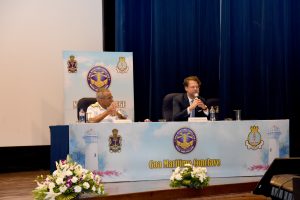 On November the 1st I am giving a presentation at a symposium of the Indian Navy. Hosted by the Indian Navy Naval War College in Goa the two-day event is focussed on “Addressing Regional Maritime Challenges” and brings together over one hundred representatives from Indian and Indian Ocean navies. Held for the first time, the Goa Maritime Enclave intends to strengthen collaboration and joint learning across the Indian Ocean. As such it is a further addition to other formats such as the Indian Ocean Naval Symposium or the Sri Lanka Navy’s Galle Dialogue strengthening the maritime ties in the region.
On November the 1st I am giving a presentation at a symposium of the Indian Navy. Hosted by the Indian Navy Naval War College in Goa the two-day event is focussed on “Addressing Regional Maritime Challenges” and brings together over one hundred representatives from Indian and Indian Ocean navies. Held for the first time, the Goa Maritime Enclave intends to strengthen collaboration and joint learning across the Indian Ocean. As such it is a further addition to other formats such as the Indian Ocean Naval Symposium or the Sri Lanka Navy’s Galle Dialogue strengthening the maritime ties in the region.
My talk draws on my recent research on maritime domain awareness and capacity building. I firstly contextualize maritime domain awareness historically, arguing that we have witnessed a series of revolutions in “knowing the sea”, starting out from the British Empires approach to turn the oceans into governable and knowable zones, the rise of attempts to track and monitor maritime traffic for search and rescue as well as environmental management purposes, up to the current day big data revolution in which advanced surveillance technology and anomaly detection is geared at supporting maritime security operations. Zooming in on the Western Indian Ocean I then investigate the claim that maritime domain awareness by virtue strengthens cooperation. I argue that on the one side, the competition between architectures points to a strong geo-political motive in building maritime domain awareness, on the other side we can observe the rise of communities of practice with the objective of working together. I conclude by arguing that advancing shared maritime domain awareness will imply to provide some order to the current complexity of architectures, to re-politicize these projects, to work towards more trust and confidence to enable sharing of information (between agencies and countries), as well as to avoid living in technological fantasies and rely on pragmatic low tech work instead. The slides of the talk are available as pdf here.